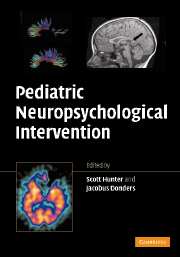Book contents
- Frontmatter
- Contents
- List of Contributors
- Section I Fundamentals of pediatric neuropsychological intervention
- 1 Introduction
- 2 A developmental approach to pediatric neuropsychological intervention
- 3 Empirical bases for assessment and intervention
- 4 Multicultural aspects of pediatric neuropsychological intervention and rehabilitation
- 5 Bridging neuropsychological practice with educational intervention
- Section II Managing neurocognitive impairments in children and adolescents
- Section III Medical, rehabilitative and experimental interventions
- Section IV Future directions
- Index
- Plate section
- References
5 - Bridging neuropsychological practice with educational intervention
Published online by Cambridge University Press: 13 August 2009
- Frontmatter
- Contents
- List of Contributors
- Section I Fundamentals of pediatric neuropsychological intervention
- 1 Introduction
- 2 A developmental approach to pediatric neuropsychological intervention
- 3 Empirical bases for assessment and intervention
- 4 Multicultural aspects of pediatric neuropsychological intervention and rehabilitation
- 5 Bridging neuropsychological practice with educational intervention
- Section II Managing neurocognitive impairments in children and adolescents
- Section III Medical, rehabilitative and experimental interventions
- Section IV Future directions
- Index
- Plate section
- References
Summary
Pediatric neuropsychologists are often looked upon to provide recommendations to the school system for the children and adolescents with whom they work. The purpose of these recommendations is generally to identify effective strategies, academic accommodations, and/or special education services that can be provided within the school setting, that are appropriate to the child's disability and functional limitations. Beyond the issue of efficacy of the recommendations being made is the issue of their legal viability and how well they conform to already established laws addressing educational placement. Unfortunately, clinicians often do not have much more than a basic understanding of legislation and statutes that determine the provision of special education services. This can lead to a lack of congruence between the recommendations being made and their effective application. Further complicating the issue is the reality that education laws are at times conflicting, and are often reinterpreted based on regionally relevant court decisions. The laws also dramatically differ in purpose and scope between the secondary and post-secondary setting (Gordon et al., 2002; Murphy, 2004; Ranseen, 1998; Ranseen & Parks, 2005). In addition, the definitions set forth in disability-related legislation are often at odds with standard practices surrounding clinical diagnostic procedures. As a result, clinicians may find themselves confused when their recommendations are not incorporated within the elementary or secondary school environment or when the individual who they tested is deemed ineligible for academic accommodations in college.
- Type
- Chapter
- Information
- Pediatric Neuropsychological Intervention , pp. 68 - 88Publisher: Cambridge University PressPrint publication year: 2007



